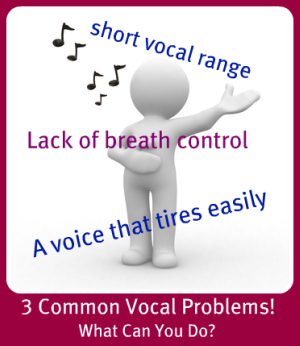Click for FREE newsletter & bonuses!
3 Vocal Problems - Common Complaints and What You Can Do About Them!

There are three vocal problems that I hear about more often than any other kinds of singer-related complaints:
1. I do not have a wide enough range. The high notes are too high. The low notes are too low.
2. My breathing is not good enough. I can't easily get to the ends of the phrases.
3. My voice gets tired far too quickly.
What Can You Do? Let's talk about these common vocal problems - one by one.
This week - #1 - extending your range.
First, a question:
Are you trying to move into a range that is really too high or too low for your voice?
You may not be able to answer this question right now. But I suggest you think about it, because I have noticed that some singers seem to want to stretch their voices into the high or low range of their singing heroes. And that may not be the wisest thing for YOUR unique voice.
But, if your feel that your voice really is too short, here is one thing to consider:
- You may be singing with too much weight on your vocal cords. That is, you may be carrying up too much "chest voice" and not moving into a "mixed voice" or "head voice" soon enough as you ascend in your range.

BUT THIS MAY BE AN EASY SOLUTION FOR YOU!
Have a look at this video.
I give you two exercises that keep you moving into the upper range - with motion. The built in motion helps you to move into the lighter feel in your throat without really thinking about it.
You just do the exercise with a playful spirit and !Voila! your are moving through your entire range!
If you cannot zip through the exercise, then you are likely starting with too much weight in your voice.
So, Lighten up! Pretend you are a very young person - with a very light, heady voice, and try these two exercises again.
This is just one suggestion, among many, to help you gain the freedom to move through your range more easily.
Another suggestion: If you feel that your throat is tired from speaking or from singing, consider using Dr. Titze´s "straw" exercise. He demonstrates it here: Dr. Titze - vocologist and singer.

Dr. Titze also uses the "pitch glide" idea to help you use your voice with a shifting "balance" in the vocal cords, that allows for easy movement through your entire range.
If these kinds of exercises do not help you over time to increase your range, then I strongly suggest that you have several lessons with a good voice teacher. You may need some individual attention to help you find the right way to develop your precious voice. (We all need that, at times!)
Next week: Breathing. How you can gradually improve your breath control.
P.S. Visit my GIFT SHOP FOR SINGERS! My latest offer is: Stage Fright - 12 Powerful Ways to Beat It! - Especially for Singers!
I wish you great singing!

Back from Vocal Problems to Singing Tips With Barbara Lewis




